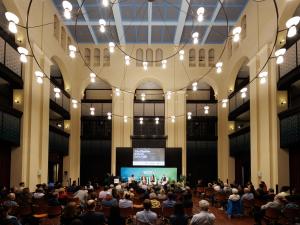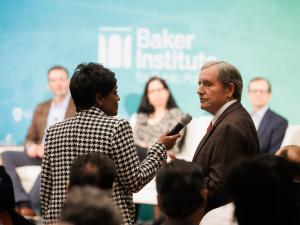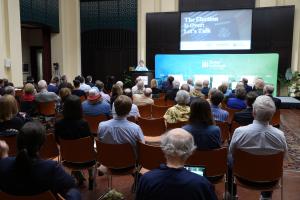
Audience listens intently as panelists share their perspectives on immigration, media and safeguarding our constitutional democracy
Anxious Americans Find Safe Space to Voice Concerns and Engage in Dialogue
HOUSTON, TX, UNITED STATES, November 26, 2024 /EINPresswire.com/ -- On Monday, November 18th, hundreds of Americans gathered in person and online for an evening of reflection, dialogue, and hope entitled "The Election Is Over: Let's Talk". The Civil Dialogues town hall at the Baker Institute at Rice University provided a much-needed sanctuary for candid conversations addressing the deep emotions many citizens are grappling with in a post-election America.The evening began with historical perspective by Jean Becker, former chief of staff to President George H.W. Bush during his post-presidency and Civil Dialogues co-founder. The panel was moderated by award-winning broadcast journalist and Civil Dialogues co-founder, Linda Lorelle. The Q&A sparked passionate conversations on key themes, including the media’s role in polarization, immigration policy’s human impact, grassroots civic engagement, and safeguarding constitutional democracy. The atmosphere was charged with urgency, yet underscored by the belief that solutions start with listening and action.
Panelist Elizabeth Mendoza, immigration attorney, gave voice to the fears of immigrant families she works with daily. “Children wonder, ‘What happens if I come home, and my parents aren’t there because they’ve been deported?’” she shared. Her raw stories laid bare the human cost of political decisions, urging attendees to see the people behind the policies.
John Gable, co-founder and CEO of AllSides, shed light on the role of media in perpetuating division, noting, “We’ve become more polarized because we surround ourselves with voices that agree with us. That’s not democracy. Democracy thrives in civil dialogue -- the kind that bridges differences and builds solutions.”
Jay Sexton, Director of the Kinder Institute on Constitutional Democracy at the University of Missouri-Columbia, emphasized the need for historical perspective and grassroots involvement. “Students often ask, ‘What’s next?’” he shared. “I tell them: Don’t plan for the 2026 midterms. Focus on your local community, engage with organizations, and safeguard our constitutional order. It’s about lowering the temperature and taking meaningful action.”
Jean Becker echoed this sentiment, challenging attendees to lean into the discomfort of civic engagement. “We need better conversations to find common ground. By coming here tonight, you’ve already taken the first step.”
Lorelle’s closing words captured the heart of the event: “This isn’t just about politics -- it’s about people. Listening, learning, and recognizing we’re stronger together, even when we disagree. The future of our democracy depends on it.”
As the audience departed, the energy in the room had clearly shifted; the initial tension and reticence to speak, replaced by a collective exhale and willingness to engage. As one participant shared, "My wife has been stressed out since the election, but tonight's dialogue calmed her down and gave her hope." Proof that conversations like these are not just necessary, but transformative. The event offered attendees a safe space to voice concerns and equipped them with tools to navigate these turbulent times. As America moves forward, events like “The Election Is Over” remind us that healing begins with understanding, and that even in division, there is room for dialogue.
In partnership with the George & Barbara Bush Foundation, the Clinton Presidential Center, the LBJ Foundation, and the Baker Institute for Public Policy and Research, the non-profit Civil Dialogues democracy initiative, seeks to create a safe space for community conversation on some of the most important and contentious topics of the day. Previous topics have included immigration, energy and climate, America's foreign policy in the Middle East, why political partnerships matter, and the importance of public service in a healthy democracy. The goal is to educate Americans about all sides of difficult issues facing our nation, ensure that participants walk away with a better understanding of both the topic's nuances and those on the other side of their beliefs, and empower them to continue having civil, constructive dialogue.
The Civil Dialogues 2025 schedule includes town halls with a variety of partners across the country, including the Kinder Institute on Constitutional Democracy and the University of Missouri School of Journalism, among others. Plans are also in the works to take Civil Dialogues onto college and high school campuses, as well as return to each presidential library partner.
To suggest topics or partner with us, click here.
Linda Lorelle
Linda Lorelle Media
+1 832-499-7875
email us here
Visit us on social media:
LinkedIn
Instagram
Legal Disclaimer:
EIN Presswire provides this news content "as is" without warranty of any kind. We do not accept any responsibility or liability for the accuracy, content, images, videos, licenses, completeness, legality, or reliability of the information contained in this article. If you have any complaints or copyright issues related to this article, kindly contact the author above.



